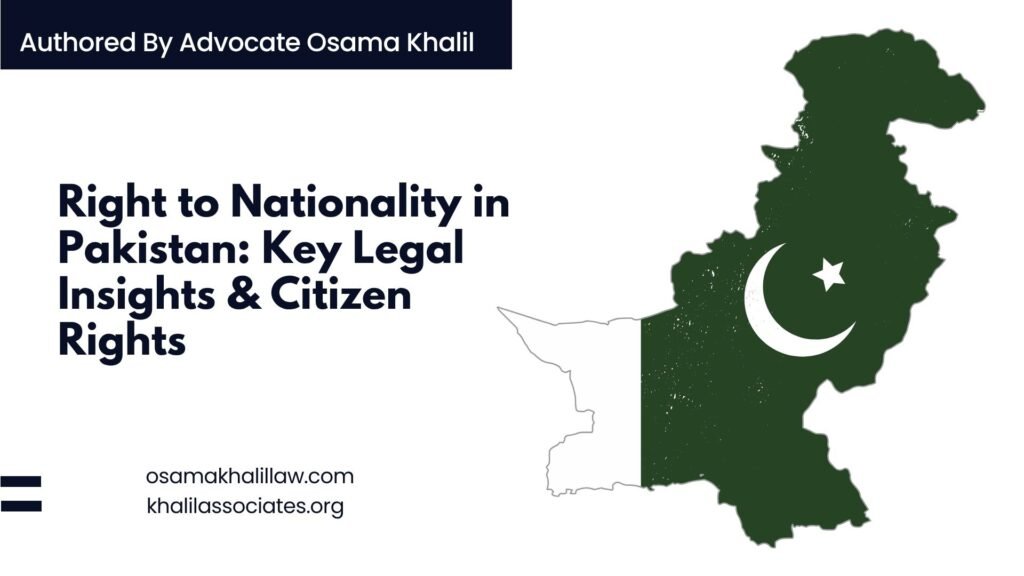
The right to nationality is one of the most fundamental human rights. Without it, individuals lose access to basic freedoms, including education, healthcare, employment, and legal protections. A recent landmark judgment in Pakistan reaffirmed this right, emphasizing that no citizen should be stripped of their nationality without due process.
This article explains the key aspects of this judgment, the legal framework protecting citizenship, and how authorities must act to prevent statelessness.
What Happened in the Case?
The case involved several petitioners, including Hafiz Hamdullah Saboor, who had their Computerized National Identity Cards (CNICs) blocked or canceled by the National Database and Registration Authority (NADRA). The sole reason given was that intelligence agencies claimed these individuals were not Pakistani citizens.
However, the court found that NADRA acted recklessly and without legal authority. The petitioners were born in Pakistan, had valid CNICs, and had lived their entire lives in the country. Some even held public offices or had family members serving in the military.
Why Is Citizenship So Important?
Citizenship is not just a legal status—it is the foundation of all other rights. When someone loses their citizenship rights, they become stateless, meaning:
- They cannot open bank accounts.
- They lose access to healthcare and education.
- They cannot vote or hold public office.
- They may face detention or deportation.
The court highlighted that nationality protection is a basic human right under both Pakistani law and international conventions.
The Legal Framework Protecting Citizenship in Pakistan
1. Pakistan Citizenship Act (1951)
The Pakistan Citizenship Act clearly states that anyone born in Pakistan is a citizen by birth (Section 4). The only exceptions are if:
- Their parents were foreign diplomats.
- They were born in an enemy-occupied area during war.
The law places the burden on the government, not the individual, to prove someone is not a citizen.
2. Role of NADRA
NADRA’s job is to register citizens, not decide citizenship status. It can only cancel a CNIC if:
- The card was obtained fraudulently.
- Someone holds multiple cards.
- The card is tampered with or forged.
NADRA cannot cancel a CNIC just because an intelligence agency claims someone is not a citizen.
How Did the Court Rule?
The court made several critical rulings:
- NADRA Overstepped Its Authority
- Blocking or canceling CNICs without proof violates the right to nationality.
- Only the federal government, under the Pakistan Citizenship Act, can decide citizenship matters.
- Birthright Citizenship Is Absolute
- If someone is born in Pakistan, they are a citizen unless proven otherwise.
- The government must follow strict legal procedures before revoking citizenship.
- No One Should Be Made Stateless
- Authorities must avoid policies that lead to statelessness.
- Citizenship cannot be taken away arbitrarily.
- PEMRA’s Ban on Media Appearances Was Illegal
- Stopping someone from appearing on TV violates freedom of speech (Article 19).
- Regulatory bodies cannot impose such restrictions without legal basis.
What Does This Mean for Ordinary Citizens?
This judgment strengthens citizenship rights for all Pakistanis. Key takeaways include:
- Your CNIC is proof of citizenship—authorities cannot cancel it without solid evidence.
- Birth in Pakistan guarantees citizenship—no one can deny this right without legal justification.
- Intelligence reports alone are not enough—the government must follow due process.
- Statelessness is a serious issue—authorities must act responsibly to prevent it.
What Should You Do If Your CNIC Is Blocked?
If your CNIC is blocked or canceled without valid reason, you can:
- File a Writ Petition in the High Court under Article 199 of the Constitution.
- Demand a written explanation from NADRA.
- Provide proof of birth and residence (school records, property documents, etc.).
- Seek legal help if authorities refuse to restore your citizenship rights.
Conclusion: Protecting the Right to Nationality
This landmark judgment reaffirms that citizenship is a fundamental right, not a privilege. Authorities must act within the law and cannot strip people of their nationality without due process.
The case sets a crucial precedent, ensuring that no Pakistani is left stateless because of arbitrary decisions. If you or someone you know faces such an issue, understanding these legal protections can help safeguard your rights.
Legal Assistance
For professional legal guidance and support in immigration matters, you may contact:
Mr. Osama Khalil
Lawyer & Legal Consultant
📞 Phone: 0316-1829946
📧 Email: contact@osamakhalillaw.com | contact@khalilassociates.org
